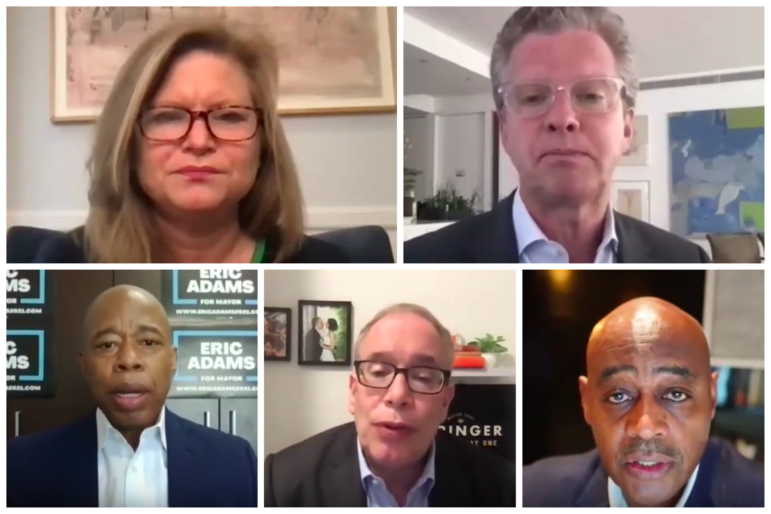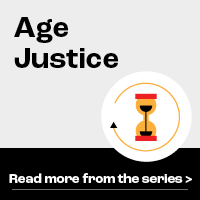
YouTube/City Limits
Five mayoral candidates participated in City Limits’ forum focused on aging issues.On Wednesday, Mayor Bill de Blasio announced what his administration dubbed a “groundbreaking” five-year initiative to expand services for New York City’s older residents, which will allocate $58 million this year alone to open 25 new senior centers in undeserved communities.
“We’ve got to do a lot more for our seniors now and for the future,” the mayor said at a press event announcing the newly launched Community Care Plan. “We’ve got to reach them in new ways. And there’s lots of communities where there’s just not enough support available to our seniors.”
But de Blasio will leave office at the end of this year, and it will be up to his successor to set the policy agenda for the approximately 1.6 million older residents who call New York home—the city’s fastest-growing age group, which is expected to reach 1.86 million by 2040.
To get a sense of what the current mayoral candidates would do, if elected, to meet the specific needs of the city’s burgeoning older population, City Limits hosted a mayoral forum on Wednesday centered around policies impacting older residents.
The event was hosted in collaboration with LiveOn NY, AARP New York, New York Academy of Medicine, United Neighborhood House, Citymeals on Wheels and Hunter Brookdale Center for Healthy Aging. City Limits asked each of the eight major mayoral campaigns to participate, and five candidates—Kathryn Garcia, Eric Adams, Scott Stringer, Ray McGuire and Shaun Donovan—ultimately took part.
The discussion covered a wide range of issues, including how the candidates would serve older constituents when it comes to things like affordable housing, discrimination in the workplace, social services, internet access, street safety and how they would have handled the pandemic if they’d been in charge.
“Senior centers, as people are getting vaccinated, should be reopened,” said former sanitation commissioner Garcia, referring to the centers which have been shuttered since the COVID-19 crisis struck more than a year ago, leaving many older residents isolated from their support networks. “They are literally sitting outside the doors of senior centers in many cases, older New Yorkers, because they need social time, they need to have connectivity.”
When it comes to housing—nearly a third of the city’s older single adults spend more than half of their income on rent, a 2016 report found—Garcia pledged to create 2,000 additional “deeply affordable” units for older adults experiencing homelessness, and to invest in retrofitting NYCHA’s senior apartments with accessibility in mind so residents can remain as they grow older.
Citigroup executive McGuire discussed his plan to spend $500 million on affordable housing with on-site services for low-income seniors. “It’s enough to build roughly 3,000 new homes per year, which is double the current rate of production,” he said, pledging that he would also ensure seniors who enter the shelter system are moved directly into long-term housing. “We cannot allow any senior to live in a shelter.”
Former state senator and current Brooklyn Borough President Adams touted his plan to launch a digital “MyCity” card, which residents could use to access programs—including seniors, who would automatically be signed up for public benefits like the Senior Citizen Rent Increase Exemption (SCRIE) rent freeze program.
“The process is too complicated,” Adams explained. “We’re taking the burden off the seniors to go off and seek what is available.” He said he would also work to increase the value of senior housing vouchers, and expand the number of NYCHA units available for older tenants.
Both Garcia and City Comptroller Scott Stringer echoed Adams’ call to make SCRIE enrollment automatic. Stringer also talked about the need to ensure new senior housing is built for those who are in greatest need of affordable homes.
“We can no longer build housing for the wealthiest people in the name of affordability, but we also have to think about people who are on fixed pensions or fixed incomes, who make less than $30,000 a year,” Stringer said.
Donovan, a former Bloomberg administration housing commissioner and HUD secretary, highlighted his campaign’s plan to issue an aging bill of rights, which would mandate “every single agency across the city government, every year, to update their plan to show how they are engaging older New Yorkers in every phase of the work that they do.”
He also pledged to open public libraries seven days a week, citing them as hubs for older residents to connect with resources and access technology.
“Older New Yorkers absolutely go to and want access, not only in their homes, but in other spaces that are a critical part of our social infrastructure,” Donovan said.
You can watch the event in full and hear the rest of the candidates’ answers in the video below.
City Limits’ Age Justice series explores the issues facing a graying New York. It is supported by the New York Foundation.









